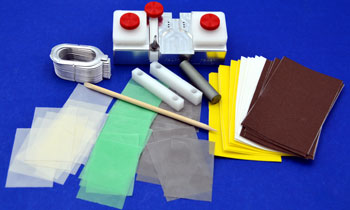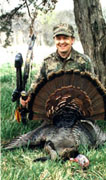Hens Are Trouble
Copyright © 1998 - 2021 Roger
W. Raisch * Nadine Adele, all rights reserved
|
Probably the biggest
problem turkey hunters face, but one that many aren't aware of as it is occurring, is that
hens are with the gobbler.
It's unrealistic to expect to
call him away from the real thing. When he has been answering your calling,
suddenly shuts up and doesn't appear in the next 30 minutes, chances are good that you
have competition from hens.
Hens with gobblers will always
spell trouble for even the most experienced hunters.
|
The hens will even
actively work to defeat your calling.
I have often watched hens
feeding peacefully with a gobbler in a field promptly walk away when I began calling,
taking the gobbler with them. My calling can't be that bad! These seem to be
deliberate acts, as if the hen didn't want to share the attention of the gobbler.
There was no indication that they were about to leave before my calling started.
|
Actually, any other
turkey with a gobbler is "one turkey too many".
I have watched plenty of
gobblers (two or more together) in the open go into strut to each other, with no hens
present, and refuse to move to my calling position.
I have also watched gobblers
that were coming to me get intercepted by another gobbler, only to have all of them walk
away ignoring my calls.
Gobblers are unpredictable,
but you can be fairly certain that if they have hens they won't leave them to look for you
in the brush.
|
So, what can be done?
A couple of SECRETS work sometimes, but not always.
If you direct your
calling to the hens they may become curious or irritated enough to come investigate. Call loud and aggressively, and concentrate on commanding calls like Cutts, Cackles, and
long strings of Yelps.
If a hen answers your calls,
come back with the same call she makes, except make it a bit longer and louder---more
intense.
If you can get the hens
talking and a bit curious, they will often start coming your way, but it may take them
quite some time to make the trip. The gobbler(s) will
usually tag along. Often, a lot of calling is required before they start coming your
way and they will have your position pinpointed.
When the hens get close, stop
calling so they will pass by or stay in front of you and resume their contented
behavior.
But, also be prepared for them
to walk right into your lap, since you've been doing so much calling they know right where
you are.
If a hen spots you and
starts Putting nervously the
gobbler will disappear like a ghost.
If he is close when the hens
spook, you will only have an instant to shoot when he comes out of strut. Your shot
will only be a good one if you had your gun on him as he approached. You'll not be
able to jerk the gun up and have a good shot, because you'll be shooting at tail feathers
flying or running away at top speed.
|
With enough scouting both
before season and during season, you should have a good idea about where flocks and
gobblers are likely to be at different times of the day.
Try to position yourself in
these strategic locations before the hens and gobblers arrive.
Then with patient
calling, a few decoys set out, and a lot of luck, the entire flock may just move right
past where you are.
With enough scouting these Spring Behavior patterns can be
determined.
|
If you find that
most gobblers you locate are with hens and they won't come to your calling, you might want
to try a desperation tactic that is similar to fall hunting.
Roost the flock, make the bird
gobble, then wait a full 20 minutes and slip quietly between the gobbler and his
hens.
Flush him and the other birds,
noting the direction they flew. Based on their direction of flight and the location
of likely nearby Strut Zones,
you should be able to predict where the gobbler will go the next morning to gather his
harem. He is likely to return to a strut zone near the roost, especially if you set
up there the next morning and call aggressively.
Use long strings of Cutts, a few Cackles, and plenty of lonesome, lost Yelps and Assembly Yelping.
|
Don't give up on gobblers
with hens....consider it a great challenge...because it is! |
| |
t

God Bless America
|
View
Cart & Check-Out
JANUARY
2026
877.267.3877
515.299.5388
24 / 7
WE answer
our
phones Personally!
|
|












